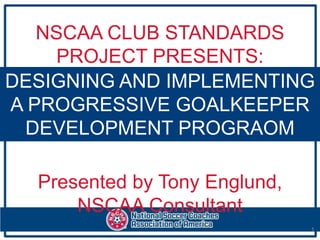
NSCAA - Designing a Progressive Goalkeeper Development Program (presented by Tony Englund)
- 1. NSCAA CLUB STANDARDS PROJECT PRESENTS: DESIGNING AND IMPLEMENTING A PROGRESSIVE GOALKEEPER DEVELOPMENT PROGRAOM Presented by Tony Englund, NSCAA Consultant 1
- 2. TONY ENGLUND NSCAA CLUB STANDARDS PROJECT CONSULTANT • 22 Years of coaching experience • NSCAA Premier Diploma, DOC and Goalkeeping diplomas • Assistant Director of Coaching at St Croix Soccer Club & Assistant Men’s – Luther. • Author - Style and Domination: A Tactical Analysis of FC Barcelona
- 3. Presentation Overview Introduction Challenges Opportunities Design Quality Program Features Access to Sample Program Outline Sources and Support Questions Conclusion
- 4. Goalkeeper Training in Player Development at the Club Level No specific program. Team coach responsibility. Specialist (isolation or team training).
- 5. Challenges Expertise 1. Specialist(s). 2. Educate coaches. Funding 1. Staff. 2. Facilities. Curriculum design 1. Priorities. 2. Comprehensive design. 3. Implementation, review and refinement.
- 6. Opportunities Failure to develop goalkeepers leads to limited potential for teams. Most critical position on the field. Improve team play on both sides of the ball. Coaching, education improving. Collegiate demand.
- 7. Design Considerations: Admin Level Club size Financial implications 1. Facilities 2. Staffing 3. Equipment 4. Extra fees (?) Scope Oversight Promotion
- 8. Design Considerations: DOC/DPD Target GK group 1. Age range 2. Ability range Club means 1. Budget 2. Staff 3. Facilities 4. Equipment
- 9. Design Considerations: DOC/DPD Curriculum 1. Scope 2. Content Schedule 1. Frequency 2. Length Assessment 1. Player feedback 2. Staff oversight
- 10. Quality Goalkeeper Development Program Features (1) First-rate staff. Appropriate facilities and equipment. Appropriate groupings 1. Age (U9-U11 or U12 and U12+). 2. Ability. 3. Trainer/Player Ratio (1:6 or smaller).
- 11. Quality Goalkeeper Development Program Features (2) Planned sessions. Progressive design. Blend 4 pillars. Both team and gk group training. Game observations.
- 12. Quality Goalkeeper Development Program Features (3) Frequent feedback. College placement. Oversight of staff.
- 13. Sample Session: Break-Away Situations Warm-up: Mirrors (2) 6x6 yard grids • One goalkeeper leads, the other follows. • Perform goalkeeper footwork throughout. • Change roles after 20 seconds. • Add a ball. ‘Keeper with ball leads.
- 14. Sample Session: Break-Away Situations Technique and Mentality: Blocking Line • GK (1) blocks 2 and then takes the ball from 3. • Play in sequence, with focus on aggressive block vs. 2 and moving forward to seize the ball from 3. • Reverse direction.
- 15. Sample Session: Break-Away Situations Control: Closing Down in a Lane • 12x6 yard lane. • Attacker (2) tries to dribble or shoot out GK’s (1) end of the lane. • Coach: Stance; approach; closing down; set-step; blocking; mentality. • Variations: Adjust lane size; attacker can only dribble; fake shot.
- 16. Sample Session: Break-Away Situations Live Play: ‘Keeper Challenge • 20x24 yard area with full-sized goals. • 1 vs. 2 to goal. • Each sequence starts with an attacker at the penalty spot with one hand on the ball. The GK must start 3 yards away. • Play to 5 goals or saves. • Variation: Starting point.
- 17. Conclusion ‘Ignore them (goalkeepers) at your peril.’ -Tony DiCicco Thanks for attending.
- 18. QUESTIONS www.nscaa.com/clubstandard s Join our Club Standards Group:
Editor's Notes
- Welcome to the National Soccer Coaches Association of America Winter Webinar SeriesI’m David Newbery, the Coordinator of the NSCAA Club Standards Project, an initiative designed to raise the performance of coaches and players one club at a time! Since May 2012 we have had over 529 clubs join representing 352K players and 33K coaches.If you have already completed the free online preliminary club assessment you can now receive an intermediate assessment including a review of current club performance, a comparison to best practices in player development, coaching and administration and scores for the 20 most common performance variables of successful clubs – For just $500. The NSCAA is delighted welcome Tony Englund An NSCAA Club Standards Project consultant to present today’s topic – Designing and implementing a progressive goalkeeper development program.
- Tony has twenty-two years of high-level coaching experience. His teams have earned multiple state championships and dozens of his former players have gone on to play at the highest levels. Tony has nearly a decade of experience as a Director of Coaching currently the Assistant Director of Coaching at St. Croix Soccer Club and Assistant Men’s and Women’s Coach at Luther College.Tony has been An NSCAA Associate Staff Coach since 2001 and holds more has a dozen NSCAA coachingawards.He has a masters degree in diplomatic and military history from the University of Minnesota – which I’m sure makes for good conversation on a roadtrip across country.A frequent presenter at symposiums and clinics in the Midwest, he is also the author of four popular soccer coaching booksHis most recent book (2012), Style and Domination: A Tactical Analysis of FC Barcelona is the publisher’s best-selling book of 2012. Tony was recently appointed as a consultant for NSCAA Club Standards ProjectTony and his wife Beth live in St. Paul, Minnesota.Welcome Tony
